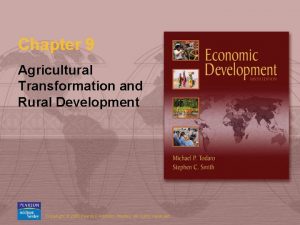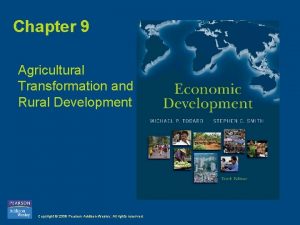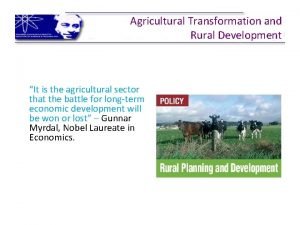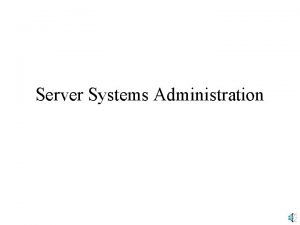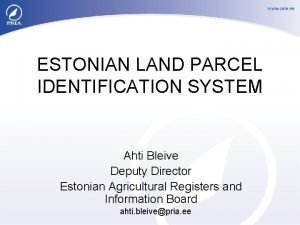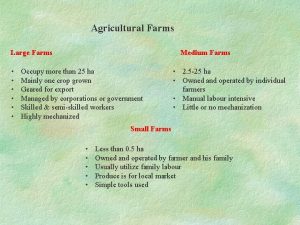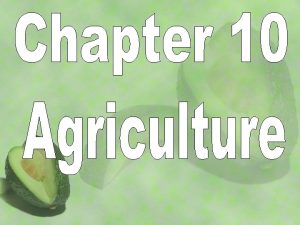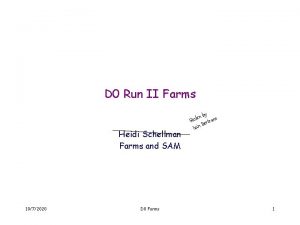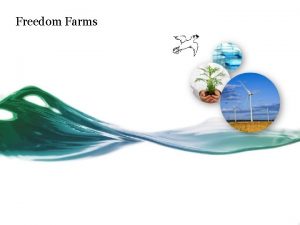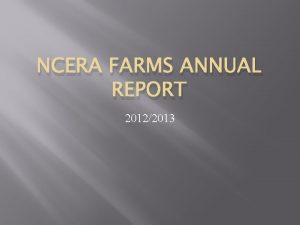Are MediumScale Farms Driving Agricultural Transformation in Africa












- Slides: 12

Are Medium-Scale Farms Driving Agricultural Transformation in Africa? Milu Muyanga, T. S. Jayne, Kwame Yeboah, Ayala Wineman, Antony Chapoto, , Divan Vanderwesthuisen Presentation at the Global FSP Innovation Lab Researchers Meeting and Closeout Conference 5 March 2019, Washington DC, USA

Key messages 1. Number of medium-scale farms (MSF) is growing rapidly 2. Medium-scale farms’ (MSF) share of total area operated is growing rapidly 3. Medium-scale farms’ (MSF) share of total marketed output is growing 4. Growing MSF is attributable to a prolonged surge in global food prices among other factors 5. Changing farm structure is fueling technical change and productivity growth at farm level, with multiplier effects throughout the economy 6. MSF are an important driver of rural transformation in much of sub-Saharan Africa

Number of MSF and share of operated area growing rapidly Farm size category Number of farms % of farms in Period II Period I (year) Period II (year) 2001 2012 0 – 5 ha 797, 157 1, 167, 315 83 5 – 10 ha 20, 832 165, 129 10 – 20 ha 2, 352 20 – 100 ha % growth in number of farms between two periods % of total cultivated area % growth in area operated between two periods Period I (year) Period II (year) 2001 2012 46. 4 79. 1 47. 9 -39. 4 12 692. 7 14. 3 25 74. 8 53, 454 4 2, 172. 7 6. 6 15 127. 3 -- 13, 839 1 -- -- 12. 1 -- 820, 341 1, 399, 737 100 70. 6 100 -- 2008 2012 0 – 5 ha 5, 454, 961 6, 151, 035 91 12. 8 62. 4 56. 3 -9. 8 5 – 10 ha 300, 511 406, 947 6 35. 4 15. 9 18 13. 2 10 – 20 ha 77, 668 109, 960 2 41. 6 7. 9 9. 7 22. 8 20 – 100 ha 45, 700 64, 588 1 41. 3 13. 8 16 -- 5, 878, 840 6, 732, 530 100 14. 5 100 -- 1992 2013 0 -5 ha 2, 037, 430 2, 580, 685 84 26. 7 60. 7 45. 5 -25. 0 5 -10 ha 116, 800 320, 411 10 174. 3 17. 2 22. 8 32. 6 10 -20 ha 38, 690 117, 722 4 204. 3 11 16. 1 46. 4 20 -100 ha 18, 980 37, 421 1 97. 2 11. 1 12. 2 -- -- 1, 740 0 -- -- 3. 5 -- 2, 211, 900 3, 057, 978 100 38. 3 100 -- Zambia Total Tanzania Total Ghana >100 ha Total

Number of MSF and share of operated area growing in Tanzania Number of farms (% of total) Farm size 0 – 5 ha 2008 % growth in number of farms between initial and latest year 2012 % of total operated land on farms between 0 -100 ha 2008 2012 5, 454, 961 (92. 8) 6, 151, 035 (91. 4) 12. 8 62. 4 56. 3 5 – 10 ha 300, 511 (5. 1) 406, 947 (6. 0) 35. 4 15. 9 18. 0 10 – 20 ha 77, 668 (1. 3) 9 109, 960 (1. 6) % 41. 6 7. 9 44% 9. 7 20 – 100 ha 45, 700 (0. 7) 64, 588 (0. 9) 41. 3 13. 8 16. 0 5, 878, 840 (100%) 6, 732, 530 (100%) 14. 5 100. 0 Total - 6. 1% + 6. 1% Data Source: LSMS/NPS 2008 & 2012

ro ot s/ tu us be tri rs al ca sh cr op s H or tic Le ut gu ur m e es /o il G se ra ed in s/ s ro o In ts /tu du be st ria rs lc as h cr op s H or tic Le ut gu ur m e es /o il se ed s In d s/ in ra G Percentage share Share of total marketed output under MSF is growing 60 50 40 30 20 10 0 Ghana [1992 -2013] Nigeria [2011 -2016] Period 1 Tanzania [2008 -2014] Period 2 Rwanda [2006 -2014]

Share of total marketed output under MSF in Ghana 5% 20 % 30 % 25 % Source: Ghana Living Standards Surveys

Characteristics of medium-scale farmers Category 1: Formerly small-scale farmers who successfully expanded their operations – • • Now typically operate 5 -20 ha About 10 -40%% of total MS farms Category 2: Rural people who were primarily in non-farm jobs, then invested in farming • • • Much more likely to be related to rural power structures – chiefs, state govt, religious leaders Now typically operating 5 -20 ha About 40%-50% of MS farms Category 3: People formerly/currently reside in urban areas • • • Formerly or currently salaried jobs, public sector Many retirees in this category Typically operating 20 -50 ha Often “telephone farmers” 15 -25% of total MS farms

Causes of changing farm structure 1. Rise in world food prices – heightened investor interest in farmland 2. Urban farmers and farm lobbies capture of land policy de facto land laws have become more favorable to MS interests 3. Rise of land markets for purchase/sale – considered illegal only 20 years ago 4. Increasing population growth leading to increased land scarcity • • Land inheritance declining Rising demand for land rising land prices Rising challenges of youth and young adults access to land migration Relatively slow growth in numbers of small-scale farms

Consequences of changing farm size distributions 1. Rising use of mechanization rental markets utilized by small-scale farms 2. The rise of this sector is associated with increased large-scale investment in grain wholesaling • Investment response by private traders in value chains due to the growing surpluses dramatically reduce the unit cost of rural assembly 3. By attracting private investment around them, these farmers may improve input- and output market access for surrounding smallholder farmers 4. To the extent that these farmers spend in the local economy – hiring labor, purchasing food and services – they will stimulate off-farm employment opportunities for rural people formerly dependent on subsistence farming

…there are some challenges 1. The rapidly growing share of land in the medium-scale holdings is leading to concentration of landownership and use • Gini coefficients on land cultivation rose from 0. 51 to 0. 54 in Kenya, and from 0. 54 to 0. 65 in Ghana; in Zambia, the Gini coefficient on landholdings rose from 0. 42 to 0. 49 • These levels of concentration “far exceed those of most Asian countries in the 1980 s. ” 2. The rising concentration of land is driving increased land scarcity • Constraining the growth of small-scale farms and raising entry barriers into farming to new entrants, like the youth and young adults 3. Medium-scale farms get their land from traditional chiefs or by purchasing land from others, including small-scale farm households • Land moved from customary to statutory tenure, sometimes leading to the loss of land by smallholder and youth and young adults

Have MS farms contributed to agricultural transformation in Africa? 1. 4. 84% real annual agricultural growth in sub-Saharan Africa between 2001 -2015 2. 70% of agricultural growth has been attributed to area expansion 3. Farms 5 -100 hectares, while accounting for 5 -10% of farms, have accounted for about 30 -50% of the growth in total national value of production (small sample caveat! – drawing from Tanzania, Kenya, Uganda, Rwanda, Malawi, Zambia, Nigeria, Ghana only) 4. MS farms appear to have contributed significantly to SSA’s agricultural growth – mainly in countries where major potential for area expansion

Thank You
 Antigentest åre
Antigentest åre Chapter 9 agricultural transformation and rural development
Chapter 9 agricultural transformation and rural development Chapter 9 agricultural transformation and rural development
Chapter 9 agricultural transformation and rural development Agricultural transformation and rural development
Agricultural transformation and rural development The driving force behind european imperialism in africa
The driving force behind european imperialism in africa Types of server farms
Types of server farms Floral shops bookstores and farms are examples of
Floral shops bookstores and farms are examples of Seva farms
Seva farms Ahti bleive
Ahti bleive Imagination farms
Imagination farms Jeffrey bewley
Jeffrey bewley Jolivette family farms
Jolivette family farms Wilshire farms
Wilshire farms

